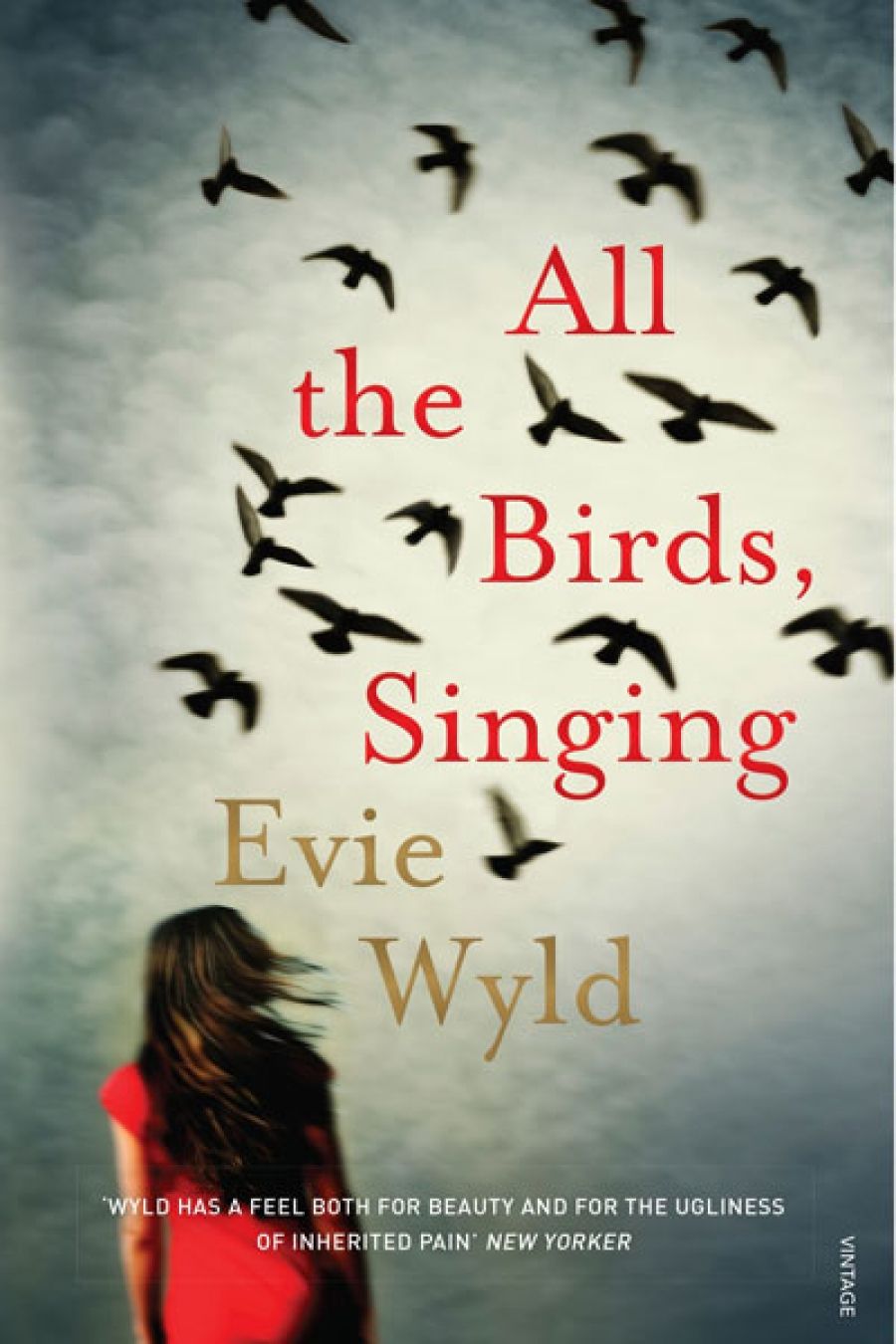
- Free Article: Yes
- Contents Category: Fiction
- Custom Article Title: Felicity Plunkett reviews 'All the Birds, Singing' by Evie Wyld
- Review Article: Yes
- Article Title: All the Birds, Singing
- Online Only: No
- Custom Highlight Text:
The shattered narrative of Evie Wyld’s second novel returns to themes of violence and its aftermath that were central to her first, After the Fire, a Still Small Voice (2009). Its protagonist, Jake Whyte, remembers just one moment of pure beauty. At fifteen, waiting after school for her sister, she is confronted by bullies Hannah and Nerrida. Into the exquisite torture of prods, yanks, and taunts – dyke, homo, Brick Shit House – comes Denver Cobby, a boy so self-possessed that when he smokes outside school, the teachers leave him alone. Jake’s chief tormentor thinks Denver’s invitation ‘You want me to walk you home?’ is intended for her. It isn’t, and Jake knows that she will pay for her triumph, even as she relishes the charge of Denver’s body close to hers and his arm around her waist. Jake’s response to the moment’s undoing is the pivot that alters her life.
- Book 1 Title: All the Birds, Singing
- Book 1 Biblio: Vintage, $32.95 pb, 229 pp, 9781742757308
The novel’s accounting has little such redemption. It deals instead with costs and reparations. Jake’s body is the site of a series of brutal payments, many of which are self-administered. Each chapter holds shards of narrative, the past revealed through scars and splinters that cut into the present. It is a novel about fear, escape, and the slight, glimmering possibility of an inviolate future.
Two bleak landscapes provide backdrop and commentary. A remembered Australia looms to replicate itself in Jake’s present on an unnamed English island. These landscapes are large, glowering, and mythic, like the characters who dot them. The novel opens with the image of a sheep: ‘mangled and bled out, her innards not yet crusting and the vapours rising from her like a steamed pudding.’ Crows have gathered. Their beaks are ‘shining’. They surround the corpse, ‘strutting and rasping … flaring their wings … singing, if you could call it that’. Despite the narrative’s past tense, the crows’ actions are part of a suspended perpetual present in which violence hovers, always about to unfurl itself. Around Jake and the dead sheep from her flock, trees are ‘rattling’ and other sheep ‘blaring out’.
The landscape is filled with malicious energy. A cold wind flings ‘sheep shit hard against the back of [Jake’s] neck’. Crows laugh as she lugs the carcass into the woolshed. Later, the anguish catches up with her: ‘I pressed my thumb into the bridge of my nose to try and take away the prickling, clung on to the skin of my chest with the nails of the other hand to melt away that old thudding ache that came with losing a sheep, a bead of blood landing in an open eye.’
‘In the Australian parts of the narrative, questions of homophobia and misogyny rumble beneath a strenuously blokish culture’
Animal and human bodily fluids leak and stain Jake’s experience. She smells like ‘billy goat’, hacks her hair off, and forgets to light a fire, though it is cold enough to make her bones ache and click where they ‘hadn’t knitted back together’. She drinks coffee and smokes while the food she plans to cook rots or stinks. The farmer from whom she has bought the farm tries to get her to be more sociable, worrying himself that she looks like a lesbian or a hippy.
In the Australian parts of the narrative, questions of homophobia and misogyny rumble beneath a strenuously blokish culture, especially when Jake gets work as a shearer. Jake and her lover Greg maintain this even in bed: ‘We do not watch each other sleep like they do in movies; if one of us wakes first, we wake the other with a rough shake, “Hey, wake up.”’ Jake jumps up and does the push-ups and sit-ups that make her feel less vulnerable.
Under the cover of the male homo-social, Jake becomes a ‘good bloke’. The ludicrous laconicism of Wyld’s Australian men is exemplified when the shearers’ supervisor, Alan, tries to talk to Jake about her relationship with Greg: ‘You’re both bloody good blokes … he’s a good bloke. And you’re a good bloke, and I reckon together, two good blokes is a good thing.’ The tangled compliment wanes when another shearer, the violent misogynist Clare, receives the same praise from Alan: ‘He’s a lunatic, a good bloke, but a lunatic.’ Worse, in terms of this culture of unabashed misogyny, he’s ‘a whinging bitch. He’s a good bloke, but a whinging bitch.’
Underneath the men’s stupidity, which veers towards the parodic, simmers a collective malevolence. Clare takes this to its extreme. His portrait follows a long line of sexually sadistic psychopaths in Australian mythic texts, from the dark figures who haunt Barbara Baynton’s short stories to the character of Mick Taylor in Greg McLean’s film Wolf Creek (2005).
Such figures inhabit landscapes whose unknowability is writ large: they emerge from and retreat into its mystery. Under its remorseless skies, Jake’s history emerges in flashbacks and nightmares, as fear and guilt combine to convince her that a dark force is pursuing her. The exact nature of the demons that pursue Jake is not Wyld’s focus. More crucial is her evocation of the way fear finds embodiment, defeating all attempts to outrun it. Wyld allows only the smallest redemptive warmth in the brooding, recriminatory places that she dramatises.


Comments powered by CComment